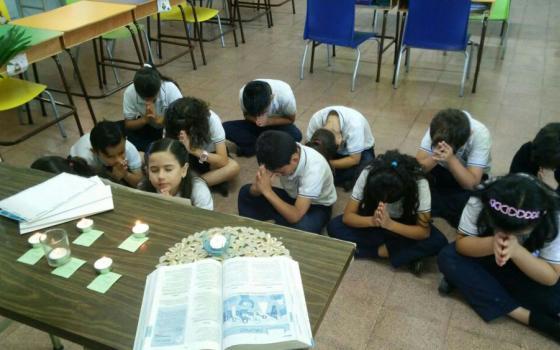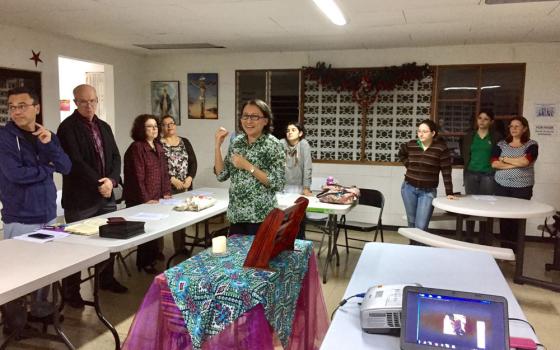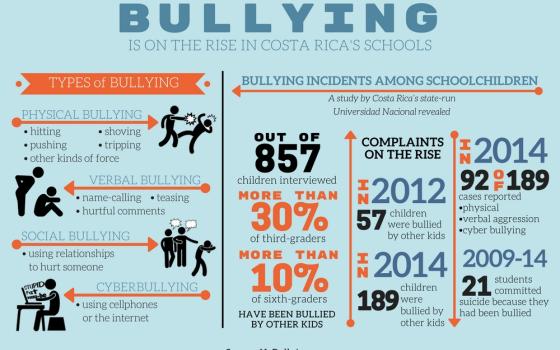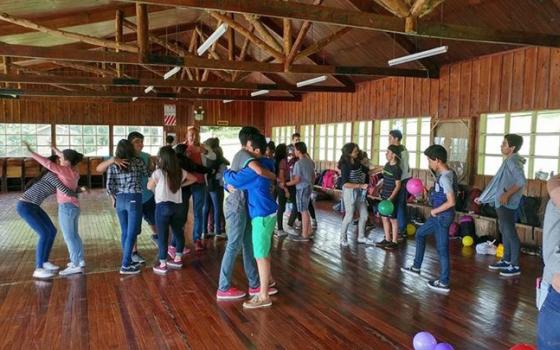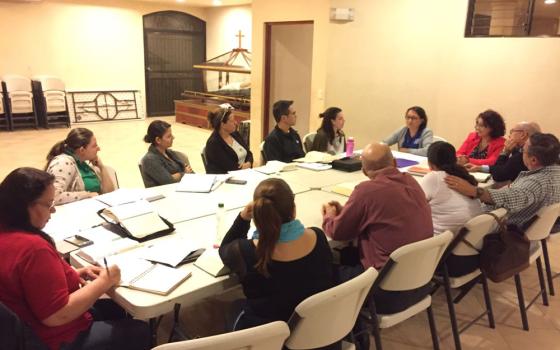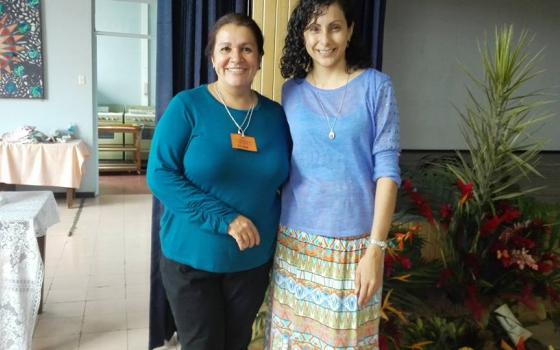After going through a divorce, Grace Jiménez's self-esteem was low.
Jiménez said her husband did not value her. He was physically and emotionally abusive and would beat her when he drank.
She was drawn to Mujer Descúbrete, "Woman, Discover Yourself," a program of the Congregación Nuestra Señora de Sion (Congregation of Our Lady of Sion), partially because of its name.
"That title told me that, well, we had to discover ourselves, that there was something in me that I had to discover," Jiménez said in an interview with GSR. "And, to tell you the truth, it helped me."
"There, I realized what one is worth as a woman," she added.
Mujer Descúbrete is one of the main components of the ministry of the Sisters of Our Lady of Sion in San José, the Costa Rican capital. The sisters' goal is to reach out to all regardless of social position, economic status, or religious belief. They focus their work towards running a school, the Colegio de Nuestra Señora de Sion (School of Our Lady of Sion); youth and women's social programs; and their Center for Biblical Studies and Judeo-Christian Relations.
Headquartered in Moravia in the northeastern outskirts of San José, the congregation works from the Colegio de Nuestra Señora de Sion, which houses the school itself, the biblical center, and the sisters' community.
"In Costa Rica, we've existed for 138 years already — we arrived in 1878 — so we have a long period of training in education, and in our education institutions ... the focal point is to promote among our students dialogue and encounter regardless of social status, regardless of the religion that's professed or the Christian tradition that's professed," Sr. Alexandra Vega, the congregation's head of vocational pastoral programs, said in an interview with Global Sisters Report.
Since its arrival in Costa Rica, the congregation has focused on education and promotion of dialogue as a means to strengthen a culture of peace.
This is the DNA of the congregation, which was founded in 1843 in France by Théodore and Marie-Alphonse Ratisbonne, two Jewish brothers who converted to Catholicism and became priests.
Théodore Ratisbonne, the key founder, created the group to work on education and as a tool to save Jews from the state of the extreme poverty they suffered because of religious, political and economic exclusion.
More than 170 years later, the congregation is in 20 countries, teaching the Bible, promoting dialogue and encouraging people to get to know one another as tools to achieve peace, whether on an individual or a collective level.
A focus on peace in all aspects of ministry
Following the Second Vatican Council's conclusion in 1965, Our Lady of Sion's sisters further embraced their aims and in the 1980s consolidated their goal as a commitment to make the world a place of peace, justice and love.
The Costa Rican sisters' students are taught that peace is built through dialogue and lack of prejudice within the family and in classrooms, where they work to overcome bullying, Vega said.
In the last few years, Costa Rica has seen a rise in bullying incidents among schoolchildren.
According to the online forum NoBullying.com, the number of complaints about bullying in Costa Rica schools rose from 57 in 2012 to 189 in 2014. Of those cases in 2014, 92 involved physical as well as verbal aggression.
Local media reported in October 2015 that a study by Costa Rica's state-run Universidad Nacional revealed that of 857 children interviewed for the report, more than 30 percent of third-graders and more than 10 percent of sixth-graders said they had been bullied by other kids.
It also showed that of those who reported being bullied, almost 80 percent of kindergarteners and 60 percent of sixth-graders said they had been repeatedly bullied, and 70 percent of those who had been bullied refused to speak about the issue because of fear or shame.
Fights and other bullying have not occurred within the Our Lady of Sion sisters' education center, which covers kindergarten, primary education, and high school, the school's activity coordinator, Maritza Chacón, told GSR.
"Our students speak of peace" when it comes to bullying, Vega said.
At the Colegio de Nuestra Señora de Sion, students are taught that "peace is built when I'm not prejudiced about others, when I don't label them," Vega said. "In the classrooms, I work on the issue of peace ... because that's very strong."
The sister said any situation of conflict — such as bullying or gender violence — becomes an opportunity for the congregation to promote peace and reconciliation, to show that violent actions are the opposite of peace.
Anger-management tips within what Vega described as the psycho-spiritual line followed at the school are given to students.
"Within that psycho-spiritual line, we always provide them with tools for releasing sadness, angst, without violence," Vega said. Two tools she uses: tearing up pieces of paper as well as drawing circles and drawing lines inside the circles.
"When we draw circles on a piece of paper, the [brain's] right hemisphere and left hemisphere become balanced, and a very important level of concentration and calm is reached," Vega said.
"Since it's a circle, at a certain moment, when both hemispheres become balanced, [the children] tend to feel calm," she said.
The sisters also teach that technique to the women in Mujer Descúbrete. The program works with approximately 300 women from their teens on in Coronado, a town about 15 miles northeast of San José.
The program is a part of a social project for women, which also includes teaching the Bible. It serves women of all social and economic strata as well as all Christian religious traditions, many of them from low-income, low-schooling, suburban and rural areas.
"There's also a technique, which is that of the empty chair. ... I put an empty chair in front of me" and imagine someone is sitting there. "So I express my pain, my anger in order to let go, because at times, what women have to do is to let go" of what they are feeling, she added.
Through the program, the women learn a trade — such as cooking or hairstyling. They also take a Bible course and attend a psycho-spiritual health workshop, "which helps their empowerment, helps them come out from depression."
"These women usually come very hurt, victims of domestic violence, [from] situations of abuse, or are really very poor women. They're women who have tried to commit suicide," Vega said. "It's impressive how a depressed woman comes to us, and a year later the change is drastic. ... She's a totally new woman."
"When they discover themselves as valuable women, self-esteem rises, family relations improve, or often, they gather the courage to report a husband who's hitting them, or they start breaking the violence circle, and then one can say that, right there, the issue of peace becomes very concrete in their own realities," she said.
Jiménez had this experience when she joined the program after her divorce.
"It helped me a lot to discover that, well, one is worth a lot. One is worth a lot, and one has someone, who's Jesus Christ, the supreme God. Just by having him, we have everything," she said.
"I began to feel that I was worth a lot ... and the Lord loved me, and what the Lord wants is for us to be happy, not to be discarded," she said.
Promoting peace in a violence-prone area
Another area where promotion of peace takes priority is the Center for Biblical Studies and Judeo-Christian Relations, where Vega works. The center reaches "all types of populations" in different parishes, including rural, urban and urban-marginal communities, from its headquarters in Moravia.
One of the communities the center ministers to is Los Guido, a sector of Desamparados ("defenseless" or "helpless"), a densely populated, lower-middle-class municipality in San José's southwestern suburban area. The community is home to some 230,000 people and ranks among the country's most violent districts.
Desampa, as it is popularly known, is one of the Costa Rican capital's sectors where organized crime, mainly drug-trafficking networks, has become gang-war territory.
Among other illegal actions, local pandillas (gangs) charge a "tax" in exchange for security in what seems to follow the model of maras, the violent youth gangs operating in El Salvador, Guatemala and Honduras.
In 2014, out of a total of 461 homicides in all of Costa Rica, 45 took place in Desampa, ranking it second among the country's most violent cantons after downtown San José, according to estimates by the Organismo de Investigación Judicial.
Also by OIJ figures, as a result of the rise in criminal activity nationwide in Costa Rica, the number of homicides, mostly drug-related and committed by hit men, rose from 461 in 2010 to 580 homicides in 2016, setting a new record in a country that abolished its army almost seven decades ago and depends on its police forces for security.
"The Los Guido parish is a particularly difficult parish because it's an extremely poor zone," Vega said. There, as members of the Comunidades de Atención Prioritaria (Priority Attention Communities, or CAP), "we provide biblical training" during "visits to families, to communities, to women," Vega said.
The San José archdiocese's CAP initiative dates back to 2012 and is aimed at having church presence in parishes with communities particularly hit by poverty. Vega said the congregation is present through members of its biblical studies center.
CAP covers Los Guido as well as other densely populated, low-income communities in the capital and surrounding areas, such as La Carpio, which is largely made up of Nicaraguan citizens or Costa Rican nationals of Nicaraguan descent and also has high levels of crime-related violence.
The Sion sisters are a part of the CAP framework, "but only for Los Guido, because it's the community where we offer biblical training."
In all the congregation's activities, "a focal point will always be the Word, but the Word linked to life, the Word which helps communities transform themselves or families or persons," she said.
People are usually receptive to the sisters' message, partially because they dress as laywomen do.
"We don't use a habit, not because of a trend but because having the spirituality of the early Christians is at the origin of our mission," Vega said.
"We manage to tune in with people because people don't perceive us as a threat. They don't perceive us as different," she added. "They perceive us as a part of them, and they always tell us so in the end."
The sisters always arrive in communities, or people come to them, through what Vega described as official church channels — for example, they are invited by parishes — and as a result of word-of-mouth about the congregation's work, which includes their biblical studies program, which lasts two years.
"But when people begin to talk with us ... they usually discover — and they tell us so — that there's something different, that there's an experience of closeness, of God, of prayer, of training that credits our work and our mission," Vega said. "Relations based on very high trust are always woven very, very quickly with people."
"I can say that when people go past that edge of prejudice and get to know us deeply, the experience is always very gratifying for both sides," Vega said.
The congregation's mission is not to indoctrinate, but to "share values that are common and experiences of the Scripture that are common to all Christians," she said.
Vega said unlike other places throughout the world, "rarely in our Latin American and Central American context, a person is a nonbeliever. Rarely, someone is ... really an atheist," she said. "Our people may be people who don't visit any particular church, but they believe in God."
"Here, even people who say they don't go to any church tell you, 'May God be with you.' "
[George Rodriguez, a freelance correspondent based in Costa Rica, has reported for Reuters and other international news agencies.]
